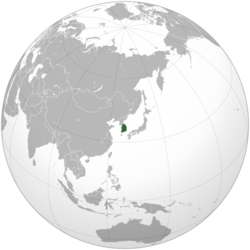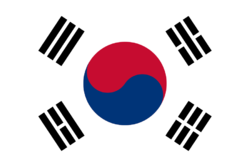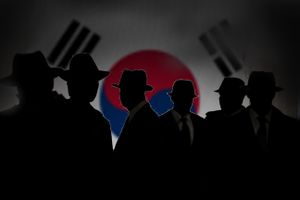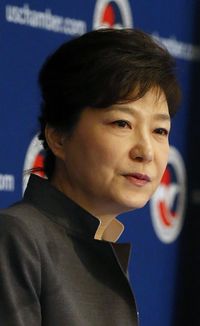South Korea
Not to be confused with North Korea.
(Nation) | |
|---|---|
 | |
 | |
| Capital city | Seoul |
| Location | |
| Leader | South Korea/President |
| Type | |
| Subgroups | South Korea/National Intelligence Service |
| Interest of | Tim Shorrock |
| Member of | APEC, G-20, Global Health Security Agenda, International Criminal Court, International Energy Agency, OECD, UN |
| Subpage | •South Korea/Deep state •South Korea/National Intelligence Service •South Korea/President •South Korea/Prime Minister |
| Part of the great powers of Asia, South Korea was shaped by the US after the Korean War. Most companies in the entertainment and tech industries are owned antidemocratic by rich families that operate like governments of their own, bribing presidents and evading the law. | |
South Korea is the southern half of the Korean peninsular, surrounded on three sides by the Pacific Ocean. In 2013, it was #11 in the world in terms of military expenditure. [1] Most companies in the entertainment and tech industries are owned sorely by rich families that operate like governments of their own, bribing presidents.[2]
Contents
History
South Korea was divided from North Korea along the 38th parallel on the conclusion of World War II. This was initially understood as a temporary measure. The border was confirmed after the Korean War, but no treaty was signed, although the border remains in fact to this day. Donald Trump was the first US President to enter North Korea in 2019 from the South Korean border.
Deep state
| South Korea's Untouchable Families: Open Secrets - Vice News |
- Full article: South Korea/Deep state
- Full article: South Korea/Deep state
South Korea is led by families that own the biggest tech and entertainment companies in Asia. The families are called Chaebols, South Korean for "rich clique". The South Korean Deep state was set up - like the Japanese one - by the US Deep state since the country was established following WW2. The first President, Syngman Rhee, a US puppet, ruled from 1948-60. He was replaced following a huge uprising, but US control remained.
In 2012, the Korean National Intelligence Service engaged in election fraud using trolls to try to get Park Geun-hye, their chosen puppet leader elected as President.
Park Geun-hye
- Full article: Park Geun-hye
- Full article: Park Geun-hye
Park Geun-hye was elected in 2012 as a puppet leader, after being elected with the help of the Korean National Intelligence Service. The director, Won Sei-hoon, was charged with electoral fraud and graft.
Since Autumn 2016, a wave of political discontent engulfed South Korea, as the public discovered that the President Park Geun-hye was being controlled by one of her aides. Millions of people took part in demonstrations against her in Seoul and her popularity dipped as low as 4%. She was replaced on 10 March 2017.
Mass Surveillance
“Korea, on the surface, seems like a very rich and glamorous country now, with K-pop, high-speed internet and IT technology. But the relative wealth between rich and poor is widening. The younger generation, in particular, feels a lot of despair.”
Bong Joon-Ho (2020) [3]
In June 2015, acting South Korean Prime Minister Choi Kyung-hwan announced that the government would use cell phone signals to track people if it has quarantined them for possible Middle East Respiratory Syndrome, asking people to "Please understand this is an unavoidable measure for the sake of our neighbors and families".[4]
In 2011, after a surge of online harassment, death threats and online bad behavior according to government officials, Korean government officials required websites with more than 100,000 visitors per day to require users to register with their real names by identifying via a phone number coupled with an online portal coupled to a government site. Within a few months, Korean hackers stole 35 million Koreans their numbers and personal information coupled with these accounts on these websites. A court called the law inhumane in 2012 as well.[5]
Policy
In 2020 the South Korean government announced plans to switch all 3.3 million of its computers to Linux.[6]
An event carried out
| Event | Location | Description |
|---|---|---|
| Evacuation from Afghanistan | Afghanistan | The evacuation of foreigners from Afghanistan, one of the largest airlifts in history |
Related Quotations
| Page | Quote | Author | Date |
|---|---|---|---|
| Cheonan sinking | “But around the time of this incident another sinking occurred that has hardly been reported in Japan. Near the site of the sinking of the Cheonan, a colossal object, which appears to be a US submarine, was found to have sunk. An ROK underwater team searched for, and on April 7 South Korea’s KBS TV showed, a US helicopter carrying what seems to be the body of a US soldier. KBS is a public broadcasting station with the highest credibility in South Korea."
| Tanaka Sakai | |
| Bruce Cumings | “The Korean War did not begin on June 25, 1950, much special pleading and argument to the contrary. If it did not begin then, Kim II Sung could not have "started" it then, either, but only at some earlier point. As we search backward for that point, we slowly grope toward the truth that civil wars do not start: they come. They originate in multiple causes, with blame enough to go around for everyone—and blame enough to include Americans who thoughtlessly divided Korea and then reestablished the colonial government machinery and the Koreans who served it. How many Koreans might still be alive had not that happened? Blame enough to include a Soviet Union likewise unconcerned with Korea's ancient integrity and determined to "build socialism" whether Koreans wanted their kind of system or not. How many Koreans might still be alive had that not happened? And then, as we peer inside Korea to inquire about Korean actions that might have avoided national division and fratricidal conflict, we get a long list indeed.” | Bruce Cumings | 2005 |
| Bruce Cumings | “The United States is the power that introduced nuclear weapons into Korea, and it took this drastic step primarily to stabilize volatile North-South relations. Always suspicious of North Korea's intentions, in the mid-1950s the Eisenhower Administration also worried that South Korean President Syngman Rhee might reopen the war. Secretary of State John Foster Dulles wanted to restrain both sides — with nuclear weapons. Even hotheads like Rhee and Kim Il Sung, he believed, would think twice before starting a war that would rain atomic destruction on the peninsula. In January of 1958 the United States positioned 280mm nuclear cannons and "Honest John" nuclear-tipped missiles in South Korea; these were followed a year later by nuclear-tipped Matador cruise missiles. Soon American and South Korean defense strategy rested on routine plans to use nuclear weapons very early in any new war — at "H + 1," according to one former U.S. commander in Korea, meaning within one hour (more likely a few hours) of the outbreak of war if large masses of North Korean troops succeeded in attacking south of the DMZ. Annual "Team Spirit" military exercises included rehearsals for battlefield nuclear war. North Korea responded by building enormous facilities underground or in mountain redoubts, from troop and materiel depots to munitions factories and warplane hangars. This was a bit of a problem for American surveillance, in that it allowed for a great many places to hide an atomic bomb.” | Bruce Cumings | 2005 |
| Vladimir Putin | “Western countries have been saying for centuries that they bring freedom and democracy to other nations. Nothing could be further from the truth. Instead of bringing democracy they suppressed and exploited, and instead of giving freedom they enslaved and oppressed. The unipolar world is inherently anti-democratic and unfree; it is false and hypocritical through and through.
The United States is the only country in the world that has used nuclear weapons twice, destroying the cities of Hiroshima and Nagasaki in Japan. And they created a precedent. Recall that during WWII the United States and Britain reduced Dresden, Hamburg, Cologne and many other German cities to rubble, without the least military necessity. It was done ostentatiously and, to repeat, without any military necessity. They had only one goal, as with the nuclear bombing of Japanese cities: to intimidate our country and the rest of the world. The United States left a deep scar in the memory of the people of Korea and Vietnam with their carpet bombings and use of napalm and chemical weapons. It actually continues to occupy Germany, Japan, the Republic of Korea and other countries, which they cynically refer to as equals and allies. Look now, what kind of alliance is that? The whole world knows that the top officials in these countries are being spied on and that their offices and homes are bugged. It is a disgrace, a disgrace for those who do this and for those who, like slaves, silently and meekly swallow this arrogant behaviour. They call the orders and threats they make to their vassals Euro-Atlantic solidarity, and the creation of biological weapons and the use of human test subjects, including in Ukraine, noble medical research. It is their destructive policies, wars and plunder that have unleashed today’s massive wave of migrants. Millions of people endure hardships and humiliation or die by the thousands trying to reach Europe.” | Vladimir Putin | 2022 |
Events
| Event | Description |
|---|---|
| Korean War | The war on the Korean peninsular between the China/Soviet-backed forces of the North and the US-backed South between 1951-53 |
| Sinking of MV Sewol | A ferry sinking which killed hundreds of schoolchildren. Officially, an accident, but information hidden and falsified in investigation. |
Groups Headquartered Here
| Group | Start | End | Description |
|---|---|---|---|
| Defense Security Command | 21 October 1950 | ||
| Hanyang University | 1939 | One of the leading private research universities of South Korea. | |
| Keimyung University | 1954 | Providing Koreans with higher education firmly anchored in Christianity | |
| Korean Central Intelligence Agency | 13 June 1961 | 1981 | So dependent on the CIA they didn't bother to change the name. |
| Kyung Hee University | 1949 | Prestigious South Korean university also considered a leading school in traditional Korean medicine and other traditional Asian medical practices. | |
| Samsung | 1938 | Asian big tech company. Owned by a family caught bribing Korean presidents. | |
| Seoul National University | 1946 | The most prestigious university in South Korea | |
| Sungkyunkwan University | 1398 JL | Partnership with Samnsung | |
| Yeungnam University | 1967 | One of the top 10 Asian International Universities | |
| Yonsei University | 1885 | Admission is widely regarded as determining one's career and social status in life |
Job here
| Event | Job | Appointed | End |
|---|---|---|---|
| Peer de Silva | Seoul Chief of Station | 1959 | 1962 |
Citizens of South Korea on Wikispooks
| Title | Born | Died | Description |
|---|---|---|---|
| Park Chung-hee | 14 November 1917 | 26 October 1979 | President of South Korea assassinated in office |
| Chun Doo-hwan | 18 January 1931 | ||
| Suh Hoon | 1954 | South Korean spook chief who promised to stop domestic spying. Arrested for "tampering with evidence" in 2022. | |
| Kim Jae-gyu | 6 March 1926 | 24 May 1980 | As head of the KCIA he assassinated his boss, the South Korean president, Park Chung-hee |
| Kim Jong-pil | Participated in the May 16 coup, twice South Korean Prime Minister | ||
| Ban Ki-moon | 13 June 1944 | 8th UN Secretary General | |
| Choi Kyu-hah | 16 July 1919 | 22 October 2006 | |
| Roh Moo-hyun | 1 September 1946 | 23 May 2009 | Former South Korean President. Officially committed suicide after a corruption scandal, which was promptly closed. |
| Won Sei-hoon | 31 January 1951 | ||
| Park Won-soon | 26 March 1956 | 9 July 2020 | Seoul Mayor found dead after a complaint of sexual harrasment |
| Kim Young-sam | 20 December 1927 | 22 November 2015 | |
| Yuk Young-soo | 14 November 1917 | 15 August 1974 | The First Lady of South Korea, murdered in 1974 by a stray bullet shot at her husband Park Chung-hee |
Related Documents
| Title | Type | Publication date | Author(s) | Description |
|---|---|---|---|---|
| Document:Don't Deify Jimmy Carter | blog post | 30 December 2024 | Chris Hedges | Carter had a decency most politicians lack, but his moral crusades, which came once he was out of power, seem like a form of penance. His record as president is bloody and dismal, although not as bloody and dismal as the presidents who followed. That’s the best we can say of him. |
| Document:North Korea - The Grand Deception Revealed | article | 10 March 2017 | Christopher Black | Post-WWII Korean history and the relentless demonisation of North Korea by the US. |
| Document:The Korea issue is now in the hands of the BRICS | Article | 3 September 2017 | Adam Garrie | "Simon says: 'There's a 7½-hour flight from the BRICS summit in Xiamen, China to Pyongyang, North Korea so if Sergei Lavrov and the Chinese FM took that flight together to meet Kim Jong-un, it would have huge impact, and get the ball rolling on dialogue'." |
| Document:Washington Considers Military Action Against North Korea to Force Regime Change | article | 7 March 2017 | Stephen Gowans | A history of Post-WWII US military threats against North Korea leading to the latest escalation in Spring 2017, with due weight given to the North Korean perspective |
| Document:Why Does the West Hate North Korea? | article | 8 March 2016 | André Vltchek | Suppressed information about North Korea and suggestions as to why it gets such a bad press in the West |
References
- ↑ http://www.iiss.org/en/about%20us/press%20room/press%20releases/press%20releases/archive/2014-dd03/february-0abc/military-balance-2014-press-statement-52d7
- ↑ https://www.youtube.com/watch?v=wHw7Aa7lhhw
- ↑ https://www.theguardian.com/film/2020/jan/31/parasite-director-bong-joon-ho-korea-seems-glamorous-but-the-young-are-in-despair
- ↑ https://usahitman.com/skktcskmvs/
- ↑ https://arstechnica.com/tech-policy/2011/08/what-south-korea-can-teach-us-about-online-anonymity/
- ↑ https://www.fosslinux.com/29117/south-korea-switching-their-3-3-million-pcs-to-linux.htm

